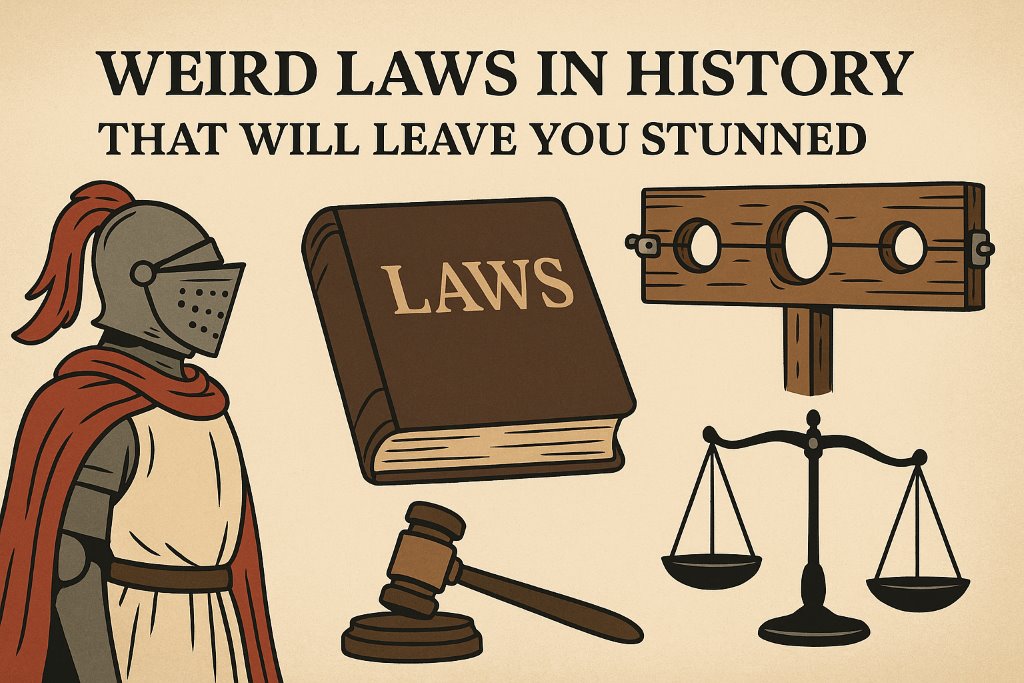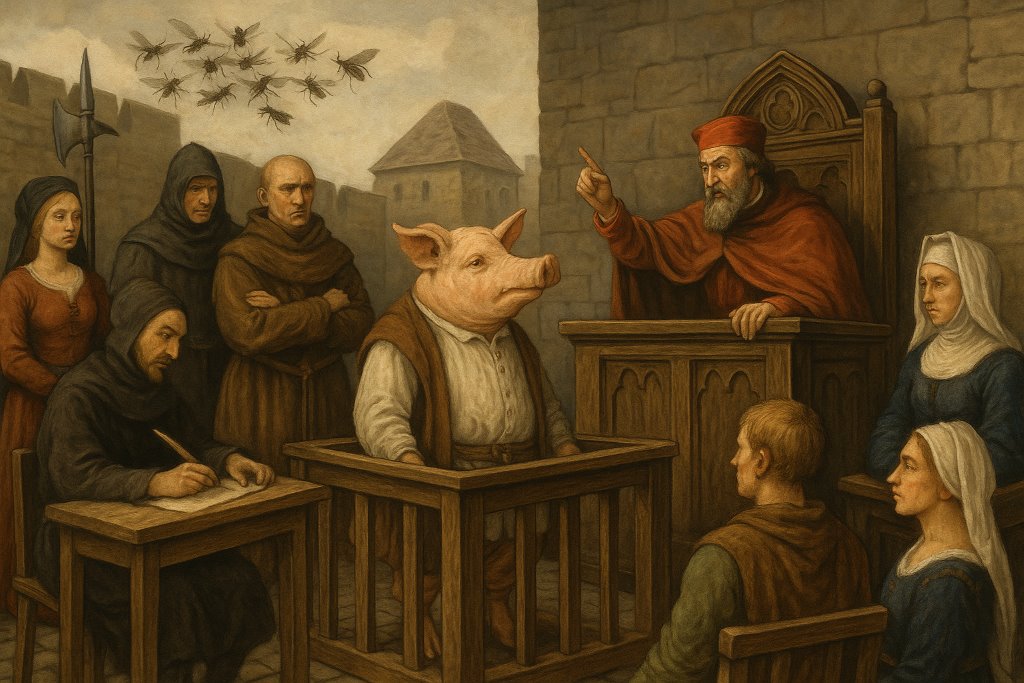
Weird Laws in History That Will Leave You Stunned
When we look back at the past, we often expect grand battles, great inventions, or inspiring leaders. Yet, tucked in the dusty books of legal codes, we find a stranger legacy – weird laws in history. Some of these rules feel amusing, others unsettling, and many leave us shaking our heads at the odd things humans once believed necessary to control. What seems laughable now was often treated with utmost seriousness. To study weird laws in history is to glimpse how societies worked, feared, and imagined order in a chaotic world.
Weird Medieval Laws

The medieval period was a breeding ground for weird historical laws, and many sound like parables rather than legislation. Animals, for example, could be put on trial. Records survive of pigs, goats, and even insects being dragged into court. In 1386, a pig in France was dressed in human clothes and publicly executed for killing a child. The symbolism was clear: even beasts could face human justice. In Switzerland, swarms of locusts were summoned to hearings and ordered to leave town or face excommunication. It’s hard to tell if people genuinely believed this would work or if it was more about ritual and control.
Sumptuary laws-the rules dictating what people could wear – also dominated medieval life. In England, only nobles could wear ermine, while certain fabrics like silk or velvet were reserved for the wealthy. In Bologna, women were once banned from wearing certain shoes considered indecent or too extravagant. Breaking these laws wasn’t just a fashion faux pas; it was a fineable offense. Every stitch of clothing became a marker of social status, and weird historical laws ensured no one forgot their place.
Food, too, was controlled. Bakers risked losing more than money if caught cheating. Bread was a staple of life, and if a loaf was sold underweight, punishments could include fines or even public humiliation in the stocks. To avoid this risk, bakers added an extra loaf to every dozen sold-creating the “baker’s dozen” tradition we still know. In Germany, strict beer purity laws dictated what ingredients could be used. At first, these rules protected consumers, but they also conveniently gave rulers economic control of markets.
Other medieval laws reveal both humor and cruelty. In some towns, dice games and singing bawdy songs during holy festivals were banned. In parts of Scandinavia, you could be fined for failing to attend church. Even marriages were tightly bound by legal quirks – at one point, men could annul a marriage if their bride turned out not to be a virgin, but women had no such right in return. These oddities show how deeply law intruded into private life, weaving morality with governance in ways we now find strange.
Strange Laws in the United States and Beyond

As societies moved forward, the world didn’t suddenly stop producing odd rules. Some of the most famous weird laws in history emerged in the United States, where local ordinances often reflected quirky concerns. In Alabama, it was once illegal to put an ice cream cone in your back pocket. The reason? Horse thieves used cones to lure animals away, technically avoiding charges of “stealing.” In Ohio, women were prohibited from wearing patent leather shoes because reflections might reveal their undergarments. Vermont tried to ban whistling underwater, though one wonders how this was tested.
Other American oddities include bans on fortune-telling, rules against carrying ice cream in your pocket (yes, it wasn’t just Alabama), and even laws declaring it illegal to tie a giraffe to a telephone pole. Though they sound like jokes, these were real, printed ordinances. They weren’t designed to amuse – they were rooted in fears about morality, theft, or disorder.
Beyond the United States, the picture is just as curious. In 17th-century Japan, eating beef or pork was forbidden, with violators fined or exiled. The ban reflected both religious belief and attempts by rulers to shape national culture. In Switzerland, families were once legally required to store emergency grain. Failure to comply could mean penalties, though the aim was survival in times of famine. Iceland is famous for its naming laws: parents can only choose names from an approved government registry. A child given a name outside this list risks not having it legally recognized. The law may sound stifling, but it was created to preserve language and identity.
These examples remind us that weird historical laws often had practical roots, even if they look silly now. They were designed to stop crime, preserve culture, or enforce morality – solutions that make sense only in their original context.
Weird Laws With Serious Consequences

While some laws were amusing, others carried harsh penalties. Ancient Sparta is a case in point. Young men were encouraged to steal food as a test of skill, but if caught, punishments were brutal. The “crime” wasn’t the theft itself, but the failure to get away with it. This twisted rule turned survival into a dangerous game.
In medieval England, forest laws turned hunting into a deadly risk. Killing a deer without royal permission could mean death or mutilation. These laws weren’t about protecting animals; they were about protecting royal privilege. Anyone who poached was seen as defying the king’s authority. The punishment was deliberately harsh to make the point unmistakable.
Religion also enforced strange restrictions. In Catholic Europe, eating meat on certain days could bring fines, public shame, or even imprisonment. Singing irreverent songs near sacred spaces or failing to bow during religious processions were not trivial matters – they could lead to excommunication. And excommunication wasn’t just spiritual; it often meant losing trade, community ties, or protection, leaving someone socially and economically ruined.
Suicide was treated as a crime in many regions. Bodies could be desecrated, and families stripped of property. This legal cruelty reveals how power and morality blurred in unsettling ways. Similarly, in some regions, women accused of witchcraft could face trial by water or fire, legal processes that often guaranteed death. These strange historical events weren’t rare – they were written into codes and treated as justice.
Why Do Weird Laws Exist?
At first glance, it’s tempting to laugh at these examples. A pig in the courtroom? An ice cream ban? But weird laws in history rarely came from nowhere. They grew out of real concerns, cultural fears, or rulers’ attempts to maintain order. Animal trials reflected belief in divine balance. Clothing rules reinforced class hierarchies. Food and drink laws protected trade – or gave kings control of markets. Even the oddest law, in its own time, felt like a logical solution to a pressing issue.
What’s fascinating is how today’s ordinary rules might one day seem just as absurd. Imagine future generations reading about internet bans, or debates over digital property. They may laugh the way we laugh at “don’t whistle underwater.” Every era thinks its laws are reasonable; history reminds us that reason is often temporary.
Top 12 Weird Laws in History
To show the breadth of strangeness, here’s a quick list of some of the most unusual laws from around the world:
- France – A pig executed in 1386 for murder.
- Switzerland – Locusts ordered to leave town by excommunication.
- England – Forest laws made hunting deer a capital offense.
- Bologna – Women banned from wearing certain shoes.
- England – Bakers punished for underweight bread, leading to the “baker’s dozen.”
- Alabama – Illegal to keep ice cream cones in your back pocket.
- Ohio – Women banned from patent leather shoes.
- Japan – Eating beef banned by shogunate decree.
- Switzerland – Families required to store grain for emergencies.
- Iceland – Parents restricted to approved baby names.
- Sparta – Encouraged theft, punished failure to succeed.
- England – Suicide punished by desecration and property seizure.
Each law reminds us how context matters. What looks like madness today once carried the weight of authority.
Studying weird laws in history is more than just an amusing hobby. It shows us the human need to create order, even through bizarre or cruel means. Whether it was pigs on trial, bans on shiny shoes, or naming laws in Iceland, each strange rule reflected the values and fears of its time. Some made sense, some didn’t, but all remind us that law is never timeless – it is always a product of culture. Today’s rules may one day look just as strange. In the end, history is proof that law, like life, is often stranger than fiction.
For further reading, see Sky History Channel post, which explore unusual traditions and their impact on society. If you love reading weird stories, don’t miss out our article: Weird Historical Facts You Won’t Believe Are True


